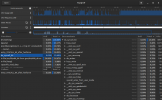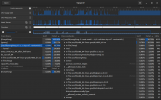D
Deleted member 143446
Guest
Hi again, I am having very strange system freezing issues. I post similar issue "about help me to find what eats my CPU" titled post. In there, I tought that mem and swap was the problem. After several days of using system profiler I noticed that problem is not related with memory. Since I have sent a sysprof tool's capture log with this post. I tested that:
1. I only opened a geany(a text editor) and a file
2. I save a file
3. I press space and press save file shortcut(CTRL+S) three times and system freezes.
4. It also happens when I changed window from one program to another.
I attached captured sysprof tool log(capture.syscap MD5 (capture.syscap) = a07bd786d172b2b295fdaab5833245d8 ) while doing this. Please, if anybody can help, help me to solve this strange freezing issue.
I used another Linux distro on the same hardware but no symptoms of such thing there. Only in my Debian Bullseye.
My system info :
OS : 5.10.0-8-amd64 #1 SMP Debian 5.10.46-4 (2021-08-03) x86_64 GNU/Linux
CPU : Intel(R) Core(TM)2 Duo CPU E6750 @ 2.66GHz
Memory : 2 GB
Graphics Card : ATI Radeon HD 4350
Thanks.
1. I only opened a geany(a text editor) and a file
2. I save a file
3. I press space and press save file shortcut(CTRL+S) three times and system freezes.
4. It also happens when I changed window from one program to another.
I attached captured sysprof tool log(capture.syscap MD5 (capture.syscap) = a07bd786d172b2b295fdaab5833245d8 ) while doing this. Please, if anybody can help, help me to solve this strange freezing issue.

I used another Linux distro on the same hardware but no symptoms of such thing there. Only in my Debian Bullseye.
My system info :
OS : 5.10.0-8-amd64 #1 SMP Debian 5.10.46-4 (2021-08-03) x86_64 GNU/Linux
CPU : Intel(R) Core(TM)2 Duo CPU E6750 @ 2.66GHz
Memory : 2 GB
Graphics Card : ATI Radeon HD 4350
Thanks.



